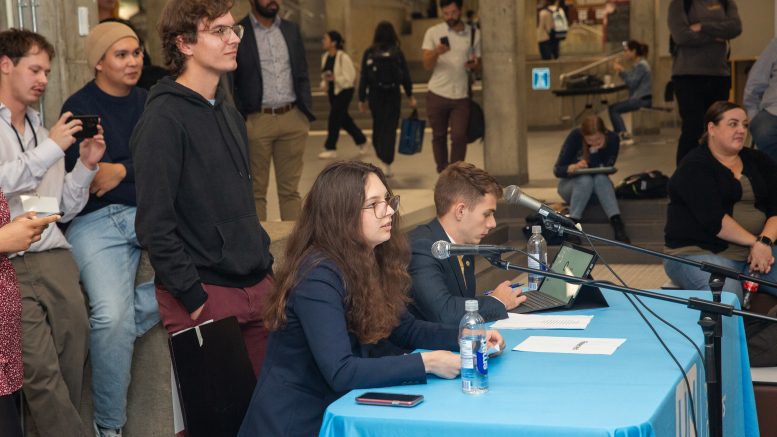Candidates from Manitoba’s four main political parties squared off on Sept. 27 in a town hall debate hosted by UMSU and the university’s political studies student association.
The union, alongside the University of Manitoba Undergraduate Political Studies Students’ Association (UPSSA), called the candidates together to share their parties’ election promises on issues that matter most to students, including housing, tuition and health care.
Manitoba Liberal Party leader Dougald Lamont and Janine Gibson, Manitoba Green Party leader, were the only two provincial party leaders to attend the event, which was titled “Provincial Leaders Townhall.”
One issue on the top of many students’ minds is international student health care — a program cut in 2018 by the Progressive Conservative (PC) government.
When the candidates were asked about international student health care, Progressive Conservative candidate for Midland Lauren Stone said that it was an issue she was “[not] very well versed on.”
The other three parties committed to restoring international student health-care coverage. Gibson called the removal “shameful” and emphasized the “investment” that providing international student healthcare would be for the province.
“International students give so much to the university and to our culture in Manitoba,” she said.
Jamie Moses, NDP candidate for St. Vital, said reinstating the program would help alleviate the affordability crisis that international students are facing. He wants to see these students choose Manitoba not only for their education, but also to live and work in after graduation.
Lamont said that when it comes to supporting international students, “it’s our responsibility to work for you as a government whether you’re Canadian or not.”
“If you’re here, you’re a Manitoban,” he said.
Tuition has been raised 10.2 percentage points in total over the past three years alone. At the debate, each candidate shared their party’s plans to address it.
Both Lamont and Moses committed to proper funding for universities, including the U of M, so that they would not feel the need to greatly increase tuition prices.
Stone said the PCs are “committed to maintaining [their] status as the most affordable tuition rates in western Canada.” In recent years, provincial legislation has required that Manitoba post-secondary institutions maintain the lowest average tuition across western Canada.
She went on to say that her party recognizes the value of grants compared to repayable student loans, and that the government has made strong investments in them. The current provincial government has allocated $10 million annually to schools across the province under the Manitoba Scholarship and Bursary Initiative.
Gibson agreed that investing in universities is important, and also addressed the income disparity between university administration and teaching assistants and professors.
Currently, students in Manitoba are struggling to find housing. One topic on many young voters’ minds is how these provincial parties will address it.
Moses said that if elected, the NDP is willing to work co-operatively with the federal government to solve the housing crisis — a relationship that has been strained under the PC government — as well as with the municipal government.
Stone mentioned that rental rates were frozen for two years under the PC government. Rather than addressing what the PCs will do about the crisis for students, she took time to discuss opportunities for first-time home buyers.
The Liberals and Greens agreed that creating 10,000 new units of affordable housing is necessary, which Lamont committed to implement if elected. Gibson committed to funding environmentally-friendly jobs required to build that housing.
Manitobans, students and non-students alike voted for their new provincial government on Oct. 3.


